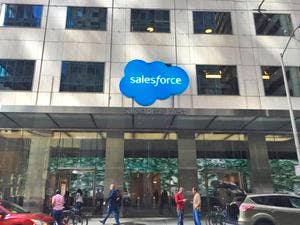Salesforce Is Counting On AI, Cloud Acquisitions For Future Growth

Salesforce is looking to take advantage of new artificial intelligence and cloud capabilities to drive growth beyond the record sales figures the cloud computing giant reported for its second fiscal quarter of 2019.
Keith Block, who earlier this month was appointed co-CEO of the San Francisco-based company, Wednesday told analysts on the company's quarterly earnings call that the company is on an upward trajectory.
[Related: Salesforce Looks To Extend Commerce Cloud To Businesses With CloudCraze Acquisition]
"We continue to deliver incredible results at scale," Block said.
Block said customers' strategic investments in their growth pushed Salesforce's second fiscal quarter 2019 growth to about double that of the market as a whole.
"This gives us confidence we can reach a revenue run rate of $23 billion faster than any company in history," he said.
The channel is a big part of that growth, Block said.
"Partners are absolutely critical to the Salesforce growth strategy, bringing deep industry and domain expertise, and they extend our reach to help drive our customers' digital transformation," he said. "And our partners continue to strategically invest in their Salesforce practices. In fact, our top five [systems integrators] increased their total Salesforce certifications by 50 percent in 2Q."
That $23 billion revenue goal, which Salesforce expects to hit in 2022, has been a goal of the company's for some time.
Marc Benioff, chairman and co-CEO of Salesforce, said customers are quickly ramping up projects related to their digital transformation while using new tools to sell, market, and innovate.
"Honestly, I feel things have never been better," Benioff said.
A major initiative of Salesforce is its Einstein artificial intelligence platform, Benioff said.
AI, along with machine learning, is giving Salesforce customers the power to do deep learning on their data even as they use the technology to learn more about their customers, he said.
Salesforce Einstein provides customers with over 3 billion predictions and insights every day, Benioff said.
"And with the next generation of Salesforce Einstein that we introduced in the second quarter, Einstein Bots, first made available on our Service Cloud, our customers can now unlock even deeper customer insights to deliver a transformational customer experience, whether it's with a service agent, whether it's with a sales agent, or whether a bot itself," he said.
Salesforce demonstrated its AI leadership by sending its automatic machine learning library for structured data, the engine that helps Salesforce Einstein, to the open source community, Benioff said.
"We've benefited from the open source community, and we're going to contribute to the open source community," he said.
The future of Salesforce is also tied heavily to several recent acquisitions that will provide customers with those tools to improve their businesses going forward, Benioff said.
One of those is MuleSoft, which Salesforce earlier this year acquired in a $6.5 billion deal. MuleSoft, which brought $122 million in revenue to Salesforce in the second quarter, has already aligned closely to the Salesforce sales team, Block said.
MuleSoft, which previously counted Salesforce both as a customer and an investor, offers Anypoint Platform, which supports service-oriented architecture, software-as-a-service integration, and API management to enable customers to secure the flow of data between all systems in the enterprise.
"This was a missing piece of the puzzle. … This is an important part in our customers' digital transformation," he said.
Benioff said that as customers move to public clouds, including to Salesforce's cloud, they need to better manage data across multiple public clouds and other SaaS providers.
The second acquisition was Datorama, an Israeli-American startup offering an artificial intelligence service to marketers that was integrated into the Salesforce Marketing Cloud. The acquisition strengthened Salesforce's ability to deliver data integration, analytics and intelligent insights to its Marketing Cloud.
The acquisition lets Salesforce extend its Marketing Cloud so customers can bring all their marketing efforts into a single intelligent dashboard, Benioff said. "So customers spend less time looking at spreadsheets and more time acting on the right insights to drive business decisions," he said.
Salesforce in the second quarter also acquired CloudCraze, which gave the CRM provider the ability to add a business-to-business component to the business-to-consumer capabilities customers have had access to via Salesforce's Commerce Cloud, Benioff said.
"This means now, with the Salesforce Commerce Cloud, our customers can create the same commerce experiences for their B2B business buyers that they do for their B2C consumers, all from a single platform," he said.
For its second fiscal quarter of 2019, which ended July 31, Salesforce reported revenue of $3.28 billion, up 27 percent over its revenue from the second fiscal quarter of 2019. Subscription and support services revenue rose 28 percent over last year to $3.06 billion, while professional services and other revenue rose 14 percent to $221 million.
GAAP net income for the second quarter was $299 million, or 39 cents per share, up from last year's $46 million, or 6 cents per share.
On a non-GAAP basis, second quarter net income was $550 million, or 71 cents per share, up from last year's $261 million, or 36 cents per share.